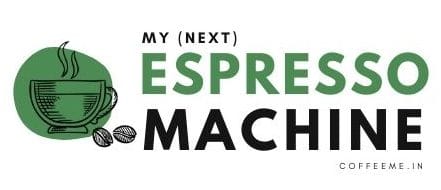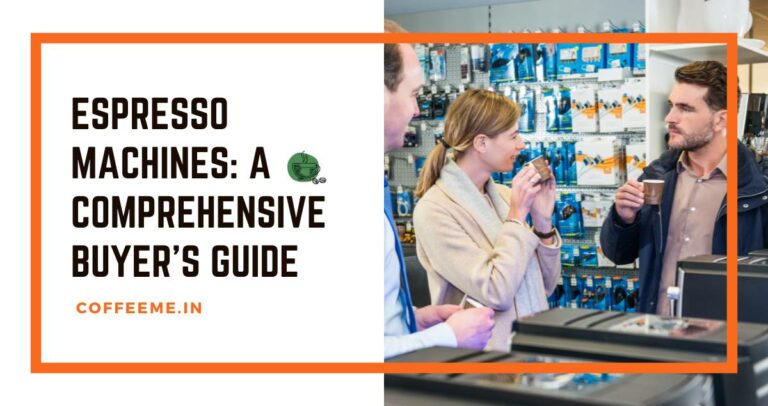Espresso machines are the holy grail of coffee-making: they converge pressure, heat, and quality ingredients to create a ridiculously good espresso shot.
As someone who takes great pride in their morning caffeinated ritual, you know nothing beats a freshly crafted cup of Espresso. It’s all the more satisfying when you control the process!
That’s why espresso machines have been so important in the world of coffee- they give us access to professional-grade brewing with just a few pushes of a button.
Our comprehensive Buyer’s Guide for espresso machines is here to provide you with all the information and guidance needed to make an informed buying decision.
We’ve got your back for every scenario, from fully automated super-automatic models to manual lever machines. Now, let’s get brewing!
Skip to the best part:
Types of Espresso Machines
There are many different options available when you’re looking for an espresso machine.
Depending on your needs and budget, you could opt for a manual espresso machine, semi-automatic, automatic, or, if you’re really feeling fancy, a super-automatic one.
Manual espresso machines
Manual machines are operated entirely by hand and require the most skill and attention from the user (see some examples on Amazon)
A typical manual espresso machine looks like this:
Pros and cons of a manual espresso machine:
Pros:
- Cheaper than semi-automatic machines and other espresso makers.
- Gives the user complete control over their coffee brewing experience.
- Easier to clean than other types of espresso machines.
Cons:
- Requires a significant amount of skill and attention from the user.
- Not as efficient at producing multiple cups in quick succession compared to semi-automatic models.
Semi-automatic machines
Semi-automatic machines require some settings from the user, such as temperature or grind size but are relatively easy to use compared to manual models. (see some examples on Amazon)
Here’s an example of a semi/super-automatic espresso machine:
Pros and cons of a semi-automatic espresso machine:
Pros:
- Gives the user more control over their coffee brewing experience.
- More efficient at producing multiple cups in quick succession compared to manual models.
- Requires less skill and attention from the user than manual machines.
Cons:
- Generally more expensive than manual espresso makers.
- Difficult to clean since many parts need to be taken apart.
Automatic espresso machines
Automatic espresso machines take the guesswork out by allowing users to press a button and enjoy their desired beverage (see some examples on Amazon).
Pros and cons of an automatic espresso machine:
Pros:
- Gives the user the most convenience when it comes to brewing coffee.
- Requires very little attention from the user.
- Easier to clean than semi-automatic and manual models.
Cons:
- Generally more expensive than semi-automatic and manual machines.
- Less control over their coffee brewing experience than other espresso makers.
super-automatic espresso machines
Lastly, super-automatic espresso machines provide even greater convenience by autonomously grinding beans and frothing milk entirely!
Here’s what an automatic espresso machine looks like – this is one of my favorite models:
Pros and cons of a super-automatic espresso machine:
Pros:
- Gives users the highest convenience when it comes to brewing coffee.
- Requires no attention from the user and produces consistent results every time.
- Easiest to clean since all parts are secured into one unit.
Cons:
- Most expensive type of espresso machine.
- Limited control over their coffee brewing experience than other espresso makers.
Consider what type of experience you’d like when deciding which machine is right for you – anything from an interactive manual brew to a perfectly crafted cappuccino with the touch of a button.
Factors to Consider When Getting Your Next Espresso Machine
Before buying an espresso machine, here are a few things to keep in mind.
- Price – Consider not only the initial price of the machine but also any additional costs associated with using it.
- Your needs – List down your needs before choosing your espresso machine. Do you usually make Espresso for yourself or also for friends and family? Do you prefer to grind the coffee yourself, pre-ground coffee, or coffee pods? Do you drink black espresso or latte drinks?
- Machine Capabilities – Make sure the machine you get matches your preferences and needs. For example, If you only drink Espresso without milk, you may not need to invest in a model with a frother. Check how automated the machine is or any special features it might have, like a temperature control knob or pressure gauge.
- Is it user-friendly? Consider how easy it is to use and clean – this will be different based on the type of machine you choose.
- Size – As with any kitchen appliance, size matters. When buying an espresso machine, take the available space you have into account.
- Maintenance – Machines will require some level of maintenance and upkeep – make sure you are comfortable with the frequency and type of cleaning needed for your chosen model.
- Durability – Some machines are made with higher quality components and will last longer, while others may require more frequent maintenance. Consider how often you plan to use your espresso machine and ensure it is up to the task.
Everyone’s needs and preferences will vary when choosing an espresso machine, but understanding these key factors can help narrow down the selection process.
Popular Espresso Machine Brands and Models
Now that we’ve gone over the types of espresso machines and key factors to consider, let’s look at some popular espresso machine brands and models.
Breville
For semi-automatic machines, Breville is a top pick. With its sleek design and intuitive controls, the Barista Express is perfect for those looking for an entry-level model with professional results. It has digital temperature control and an integrated conical burr grinder, so you can get your brew just right every time! Read our Barista Express Review.
DeLonghi
Another popular Espresso machine brand is DeLonghi. It has a range of affordable espresso machines that offer great value for money. Their flagship model, the DeLonghi La Specialista, is a fully automatic espresso machine. It uses advanced technology to deliver consistent, high-quality espresso shots at the touch of a button.
La Marzocco’s
If you’re willing to spend (a lot) more on quality components, then La Marzocco’s Linea Mini is a must-have. This Italian machine combines manual-style brewing with modern technology like dual boilers and digital displays. It’s powerful and stylish, making it ideal for anyone wanting to up their home espresso game.
Smeg
Finally, Smeg’s retro-style espresso machine is perfect for those looking to add a touch of vintage style to their kitchen. It has stainless steel details, an illuminated control panel, and all the features you’d expect from a modern machine, including a built-in grinder and adjustable steam wand. For example, check out this pastel green Smeg espresso machine on Amazon.
Nespresso
Nespresso is another well-known espresso machine brand famous for its convenience and ease of use.
Their VertuoLine models come in various colors, making them a great addition to any kitchen. All you need to do is pop in a Nespresso pod and press one button – it doesn’t get any easier than that!
If I had to choose one popular machine model, it would be their Breville Nespresso Creatista Plus (check price on Amazon)
No matter what your budget or experience level, there’s an Espresso machine out there that’s perfect for you. The key is to do your research and choose a brand and model that’s right for your needs and preferences. With a high-quality espresso machine, you can enjoy delicious, professionally-made coffee at home anytime you want.
Read more about our favorite espresso machine brands here.
Tips for Maintaining and Using Your Espresso Machine
Now that you have your espresso machine, there are several steps you can take to ensure it lasts a long time and produces the best possible coffee.
- Regular Cleaning – You should clean all components of your espresso machine regularly, including the portafilter and steam wand. Pay special attention to parts exposed to water, like seals, and filters, by using an appropriate detergent for descaling.
- Use Quality Beans – Use quality beans designed especially for espresso machines. The beans will taste better and extend your machine’s life.
- Grind Size & Temperature Adjustment – For optimal results, ensure you adjust the grind size and brewing temperature according to recommended settings provided with your machine.
- Avoid Overfilling – When tamping the ground beans in the portafilter, ensure not to overfill it. This can cause coffee particles to overflow when brewing, resulting in an inconsistent brew.
- Descaling – Descaling your espresso machine regularly is essential for keeping it in top condition and achieving the best possible results. Keep an eye on any limescale buildup, especially when using hard water.
Following these tips will help keep your espresso machine running smoothly and produce delicious coffee with every use. The key is to pay attention to all machine components and use quality ingredients for the best possible results.
Some final thoughts
At the end of the day, choosing an espresso machine is an individual decision. It all comes down to your needs and preferences, so do your research before investing in a new model.
Investing in a high-quality espresso machine can elevate your coffee-drinking experience and provide you with a lifetime of enjoyment.
From semi-automatic machines like Breville’s Barista Express to fully automatic models such as DeLonghi’s La Specialista, plenty of great options offer great value for money.
Remember to follow the necessary maintenance steps and use quality ingredients for consistent results every time!
All in all, choosing an espresso machine is a personal decision that should be based on your needs and preferences. Whether










